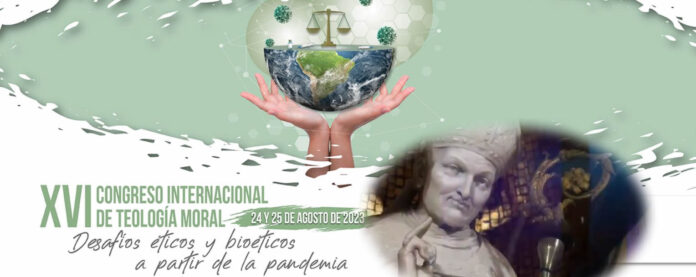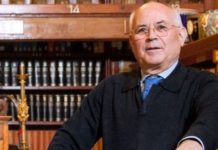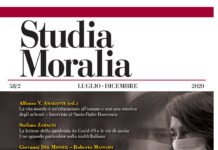On 24 and 25 August, in the auditorium of the Colombian Academy of Language, the XVI International Congress of Moral Theology was held with great success under the title “Ethical and Bioethical Challenges from the Pandemic”. This event, organised by the Fundación Universitaria San Alfonso de Bogotá (Col.), benefited from the outstanding collaboration of the Pontifical Alphonsian Academy of Rome and other internationally renowned institutions.
Among the 200 attendees at this Congress, we were pleased to have the presence at the table of honour of distinguished personalities, such as:
Archbishop Luis José Rueda Aparicio, Archbishop of Bogotá and alumnus of the Pontifical Alphonsian Academy in Rome.
Mons. David Paul Charters who plays an important role as Chargé d’Affaires of the Nunciature.
Father Luis Carlos Jaime Murillo, Provincial of the Redemptorist Province of Bogotá and Grand Chancellor of the San Alfonso University Foundation.
The presence of these distinguished personalities at the table of honour added significant value and solemnity to this important academic event.
Óscar Báez Pinto (Rector), who paid special tribute to the outstanding academic, intellectual and pastoral work of Frs. Marciano Vidal and Silvio Botero. These Redemptorist missionaries have dedicated a considerable part of their lives to the revitalisation of Moral Theology in the Catholic Church in recent years, following the example of St. Alphonsus Maria de Liguori, bishop and doctor of the Church.
Rogério Gomes, the Superior General of the Congregation of the Most Holy Redeemer, whose talk “Control and vigilance in the time of Covid” dealt with a crucial theme for our times. From the Pontifical Alphonsian Academy, Fr Giovanni del Missier (virtual presentation: “The ethics of vaccines: production, resistance to vaccination and global justice”), Fr Martin Mckeever C.Ss. R (paper: “Realpolitik between permacrisis and social paralysis: towards a theological-moral evaluation”), Fr. Mario Boies C.Ss.R (paper: “Neuropsychological effects of the pandemic on moral judgement”) and Fr. Antonio Gerardo Fidalgo C.Ss.R (paper: “The Covid-19 pandemic as learning. Different narratives”). Olga Consuelo Vélez (paper: “Faith, the Church and ethical commitment in the post-pandemic”), Ángela Patricia Rincón (paper: “Practices of bio-power based on the pandemic. Human commitments and social challenges”) and Mag. Diana Milena Parra (paper: “Covid 19 and neuropsychology: Challenges and current challenges”) offered valuable perspectives.
From Spain, Dr Luis Enjuanes Sánchez (virtual presentation: “Origin of SARS-CoV-2, short and long term pathology, vaccines and antivirals”) and Dr Enrique Lluch (virtual presentation: “Changing the economistic paradigm from the pandemic”) enriched the event with their contributions. Other notable speakers were Monsignor Noel Antonio Londoño Buitrago C.Ss.R., Bishop of Jericó-Antioquia (paper: “Ecobiology in the framework of the Covid-19 pandemic”), Dr. Manuel Méndez from El Salvador (virtual paper: “On the incidence of mental health. A sustainable approach after the pandemic”) and from England Dr. Sergio Chaparro (virtual presentation: “Inequality in a post Covid-19 society”).
The Congress left a deep impression on all those present, generating significant reflections on the ethical and bioethical challenges posed by the pandemic, as well as opportunities to move towards a more ethical and just world in post-Covid-19 times. The event came to a successful conclusion. The next Congress will be held in two years.
Carlos Darwin Rojas, C.Ss.R
Professor and Academic Vice-Rector of the San Alfonso University Foundation
P. Rogério Gomes: “Moral theology and bioethics have a fundamental role to play in order to live an ethical and just life from a Christian point of view”.
P. Rogério Gomes C.Ss.R., Superior General of the Redemptorist Missionaries and member of the Pontifical Alphonsian Academy in Rome, opened the XVI International Congress of Moral Theology in Colombia with a very interesting reflection. Fr Rogério Gomes said:
“More than a pandemic, we can say, it is a syndemic because it is not only the reality of a disease that has infected the world, but it is also the situation of a planet that is increasingly sick at different levels: ecological, social and crisis of values”.
Father Rogério then presented a brief analysis of what has left the “syndemia”, as he calls it:
“We have learned to live with loss, both financial and of loved ones,
we have learned to communicate with digital media,
we have learned to use social networks,
and science has revealed its ability to heal and save…that’s why we are here now,” he said.
“However, after this experience, we have not yet learned how to care for the world, with these crises and wars we live through.”
In his conclusion, he pointed out that the Congress and each participant will be able to contribute to show that ethics and moral theology can give answers to the challenges that this situation has left us.
“Above all, how moral theology and bioethics can offer guidance in the search for ethical and solid answers. Moral theology and bioethics play a fundamental role in the reflection on how to live an ethical and just life from a Christian point of view”.
You can listen to the entire speech and other conferences on the Facebook page of the Saint Alphonsus University Foundation.
The entire programme in our previous news about the Congress







